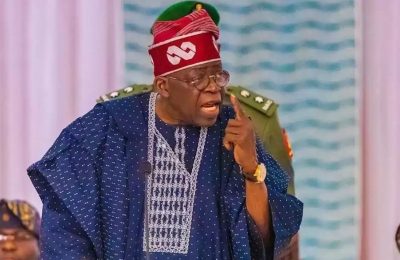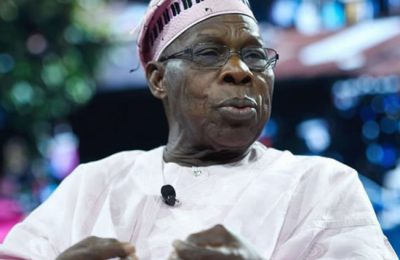

Presently, there is heightened tension in some parts of Nigeria. In some other parts, there is assurance and calm anticipation. The former is the case with Nigerians who believe — no matter how little — that the Election Tribunal will shake up the announced results of the presidential election. In the latter camp are Nigerians who have peace of mind and confidence that the Tribunal will — whether due to the legitimacy of the Tinubu-Shettima ticket’s win or the expectation that it will be business as usual with the Nigerian Judiciary — uphold the results of the election as announced by INEC.
On either end of this divide are Nigerians whose expectations from the Tribunal reflect their choices during the election, giving credence yet again to how personal choices influence our expectations, perceptions, and interpretation of results. “Let the law run its course.” Yet, those in the Atiku-Okowa camp expect that the law will reverse the election results and declare their candidate as the rightful winner. In the same vein, the Obi-Datti camp believes that justice would only have prevailed when their candidate and his running mate are declared as the rightful winner of the elections. This proves that in a democratic system, there will always be aggrieved people.
Recent elections in the country — starting from the Osun gubernatorial election that preceded the overall national elections in 2023 — have witnessed several vote cancellations. AyishaOsori drew participants’ attention to this particular concern at the last edition of the Toyin Falola Interviews. Results cancellation has successfully registered as an avenue for manipulating election results, buying time for anointed candidates, and making candidates not so sure of winning the election eventually emerge as winners. It played out in the Adamawa and Kebbi states — where 20 of the 21 local government areas in Kebbi State had cancelled votes, all totaling about 90,000 cancelled votes. There is, therefore, the need to understand what these cancelled votes are, what they mean exactly, and how they have continually served as machinery in the hands of election manipulators. We mustalso ask ourselves: Why does the election-organizing body cancel votes to the tune of hundreds and tens of thousands in each state? Why do we have so many cancelled votes?

Vote cancellation often leads to supplementary elections in the affected local government areas. What these supplementary elections mean is that they help aspirants strategize how to gain vote share in the affected areas. It is an avenue to go out and have a do-or-die fight-to-the-finish run. Therefore, it is always in favour of the candidate who was not leading — most likely the one in the second position — during the live counting of election results, as supplementary elections are an avenue to close up the gap and eventually win.
There is a need to explore the lacunae in the Electoral Act, which has supported widespread vote cancellation, especially the empowerment of electoral officers to cancel election results in a polling unit. Although this empowerment by the Electoral Act is to help mitigate rampant instances of over-voting, it is not worded in a way to help arrive at optimal outcomes, as it leaves vote cancellation at the discretion of each electoral officer — so much so that even an instance of over-voting caused by just one vote is an acceptable condition for vote cancellation.
The ability of just one vote to determine the outcomes of every other vote cast at a particular polling unit on a given election day makes the Electoral Act porous, as the subjectivity of the electoral officers can be leveraged by power-hungry political parties to spur vote cancellation in their opponents’ stronghold, thereby buying themselves more time to deploy more machinery for electoral malpractices — whether it be more thugs, complicit law-enforcement officers, more funding for vote-buying, or any other form of result-manipulating machinery.

Given the sheer amount of power the Electoral Act grants to the INEC body and its officers, it is pertinent that electoral officers, resident electoral commissioners, and returning officers are people of high moral standing that are largely insulated against corruption, bias, and bribery. However, this is rarely the case in Nigeria. The quality of the people who hold these positions — being the ones that control the fairness or otherwise of the electoral body — is what AyishaOsori finds highly questionable and which we all, as concerned Nigerians, should also find questionable.

Electoral officers, resident commissioners, and returning officers must be independent and non-partisan. However, the reverse is the case in most instances in Nigeria. Over and over again, there have been filmed instances where electoralofficers and returning officers showed bias and were outrightly partisan in discharging their duties. We have also witnessed cases where card-carrying members of political parties end up in these electoral positions. AyishaOsori believes that Nigeria’s electoral problems will never be resolved if we do not arrive at that point where we thoroughly screen members of the electoral body to check their antecedents, affiliations, political leanings, friends, and associates and ensure that they are as non-partisan as expected. We should hold returning officers, electoral officers, and resident electoral commissioners to a similarly rigorous standard and routine by which we hold our judges.
However, the question remains: even if we were to successfully get enough Nigerians that fit the moral and non-partisan characteristics required for the positions of returning officers and resident electoral commissioners, can we get as many Nigerians to function as electoral officers and presiding officers across all polling units? Knowing the peculiarity of Nigeria as a corrupt country, it is difficult to ascertain the feasibility of a sustainable selection of high-quality and skilled people for the important roles of electoral officers, resident electoral commissioners, and returning officers.
This need stems from the fact that irregularities in the Nigerian electoral process have — from time immemorial — always been through the collaborative efforts of stakeholders in the elections (political parties, electoral officers, resident electoral commissioners, and law enforcement agencies, among others). Take the debacle and shenanigans of the Adamawa gubernatorial election, for instance. The announcements of fake election results were fully backed by the state’s police commissioner and the Department of State Security, and one of these announcements was made by the Resident Electoral Commissioner for Adamawa State. This said, the announcement was made without the breakdown of results or any proof — all the REC had to declare the APC candidate as the election winner. But for the intervention of the national body of INEC, the announcement would have held water, leaving the eventual true winner Ahmadu Finitri to challenge the election results through the rigorous and sometimes unrewarding path of election tribunals and courts of justice.
Therefore, it is insufficient to call for adjustments to the Electoral Act or increased funding for Nigerian elections. Themore compelling questions need to be asked, there has to be a full mapping out of the root problems of the Nigerian electoral system and process, and there is also the need to combat these problems collaboratively, the same way stakeholders have been collaborating to cause irregularities or engage in electoral malpractices.
If anything, one of Nigeria’s biggest problems is that corruption and crime are enticing and promising in the country — enticing because Nigeria is a largely poor country where one’s engagement in crime or corruption could be their easy pass to a future of generational wealth, and promising because the consequences of corruption in Nigeria are ridiculously low, even if the perpetrators are accosted.
Since crime pays off and being a criminal is not dangerous, there is less motivation to desist from criminal or illegal acts in the country. To fully combat electoral malpractices, engaging in electoral crime has to be made unenticing, and the easiest way to make it unenticing to other Nigerians is to ensure that perpetrators of any form of electoral crime are severely and appropriately punished.
When some are made scapegoats, and there is an active and heightened search for electoral offenders, the people would understand that there is no more laxity or laissez-faire to electoral processes in the country. Anything short of this would mean that our elections would continue to be as they have always been — which would, in turn, give some people the audacity to claim that some others can never emerge as the winner because they do not have the structure to win, of which structure here is nothing but the structure of electoral manipulation.
Another point to ponder from AyishaOsori’s commentaries on the 2023 elections is the possibility of us all burrowing down an endless rabbit hole if we solely banked on the results from the elections — especially the presidential election — as our point of reference for claiming that the 2023 elections were free, fair, and credible. According to her, the competitiveness in the presidential results does not automatically translate to a strengthened democracy. In her words, “…there is a thing like competitive authoritarianism. You can have competitive results without the country being more democratic.” Osori believes that solely focusing on the results as a way of proving the credibility of the 2023 elections is a distraction from the other pockets of issues aggregated by agitators in their claim that the elections were neither free, fair, nor credible.
If competitive authoritarianism or any of its variants was truly the case in the 2023 elections — that is, if the results are rather a subtle way of rigging to evade detection or make it difficult to prove irregularity — then the perpetrators would have successfully set Nigeria back by many years. This is because while we would have gone back to something akin to the crude years of massive and widespread electoral malpractice, the subtlety in the perpetrators’ actions would make it much more difficult to prove, and to be difficult to prove is equivalent to it being difficult to identify. Difficultyin identifying the problems and their characteristics means there will be a corresponding difficulty in battling the problem. And there, thus, the puzzle of the Nigerian 2023elections lies.
In the coming years, Nigerians and their newly elected leaders will not only need to drag the country out of the mire of economic calamity and insecurity but will also need to answer fundamental questions that will shape the approach to elections and electoral processes and choices in the country — some of these questions are what AyishaOsori asked and commented on during the discourse.
This is the final part of my reflections on thePanel Discussion on Nigeria’s 2023 elections by AyishaOsori, Jibrin Ibrahim, Cynthia Mbamalu, and ChidoOnumah. The session, which has received millions of views across different platforms, discussed the various aspects of the elections. My views below are not necessarily those of the four panelists. For the transcripts, see:
YouTube: https://youtube.com/watch?v=mDGGO7ffzuw
Facebook: https://fb.watch/jX_ecFA_ZE/








